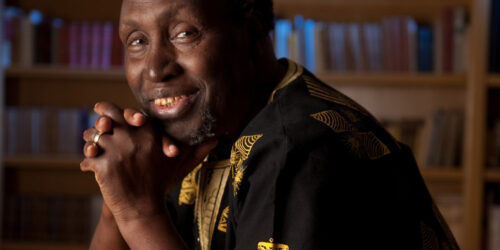
We were delighted to welcome poet and translator of Tamil poetry, Shash Trevett, as our first Visible Communities virtual writer in residence from January to April 2021 . During her residency, Shash reflected on her poetry and how it informs her work as a translator. You can read an excerpt of Shash’s commission, which unpicks her theory and practice, below.
The Tamil writer Ambai, in a recent article published in scroll.in, likened the translation of Tamil into English to ‘piercing a mustard seed and pushing seven oceans into it’: an impossible feat. Her article denigrated the role of the translator, revelling instead in the untranslatability of Tamil. While acknowledging that the translation of Tamil texts into English can be a difficult process, I do not subscribe to this view, for this would label the language as failing in its most fundamental function: as a mode of communication. Tamil, like many other languages, poses challenges to translators as they try both for a ‘faithful’ translation of a source text and for the creation of a poem that is aesthetically coherent in the target language. Choices have to be made about what needs to be included, what discarded, whether to translate idioms, how to translate local flora, customs and cultural practices.
‘Sri Lankan Tamil texts are fighting back against two forces of colonialism.’
Recently I’ve been reading translations of Sri Lankan Tamil poetry for a book I am co-editing with Vidyan Ravinthiran and Seni Seneviratne. We noticed that translations differed depending on the location of the translator; that the translations coming out of Canada and Sri Lanka seemed to favour the literal over the literary. For example, most Tamil poetry is written in short lines comprising of roughly 5 syllables. Translators seemed to favour transmitting the language and topography of a poem unchanged from Tamil to English, leading to short-lined poems which were extremely long, which did not flow. I was puzzled by this. These were the work of experienced translators who had published widely and had won awards, and I wanted to question why this model of translation has found currency in the Tamil publishing industry. During this residency I worked alongside a translator from Canada, studying the way we both translated the same texts. I also talked with other translators and by the end of the residency, I had gained an understanding of some of the pressures faced by translators working within the diaspora and in Sri Lanka. I must stress here that I am solely dealing with Sri Lankan Tamil texts, not Indian Tamil texts. The two are vastly different, with each having their own preoccupations.
‘Tamil translators are trying to reclaim these texts, re-writing the lived experience of the language itself.’
Sri Lankan Tamil texts are fighting back against two forces of colonialism. Firstly, during the eighteenth and nineteenth centuries, translation was used hand-in-hand with colonial and military methods to further the imperial venture. The only representation of Tamil people and their literature was through an orientalist gaze. Since Independence the struggle for Tamil autonomy and the long years of the civil war, has prevented Tamil translators from rectifying this situation. It is only now that modern Tamil translators are trying to reclaim these texts, re-writing the lived experience of the language itself.
Read the full article and a sample of Shash’s translation here >>
Find out more about Shash’s Visible Communities residency in this episode of The Writing Life podcast:
Image: Photo by Debby Hudson on Unsplash
You may also like...
Translating Sri Lankan Tamil poetry
With literary translators Shash Trevett and Geetha Sukumaran

16th August 2021
‘This is what we do, as translators: we keep listening and we keep adapting’
Cypriot writer Constantia Soteriou in conversation with translator Lina Protopapa

24th September 2020
A Life in Translation
Ngugi wa Thiong’o on his career and the issues surrounding writing and translation today

8th February 2017






